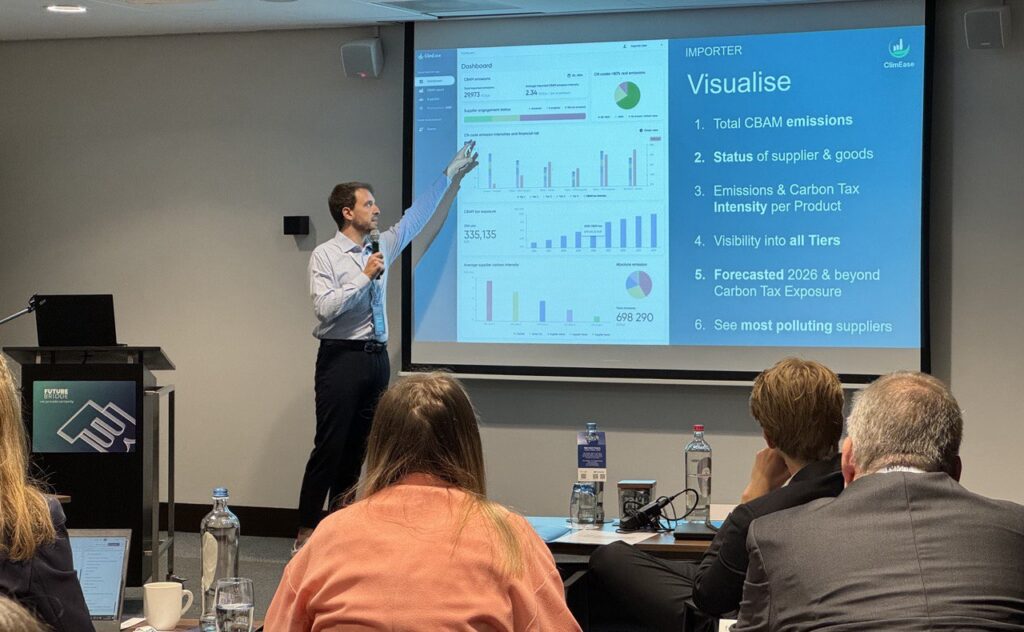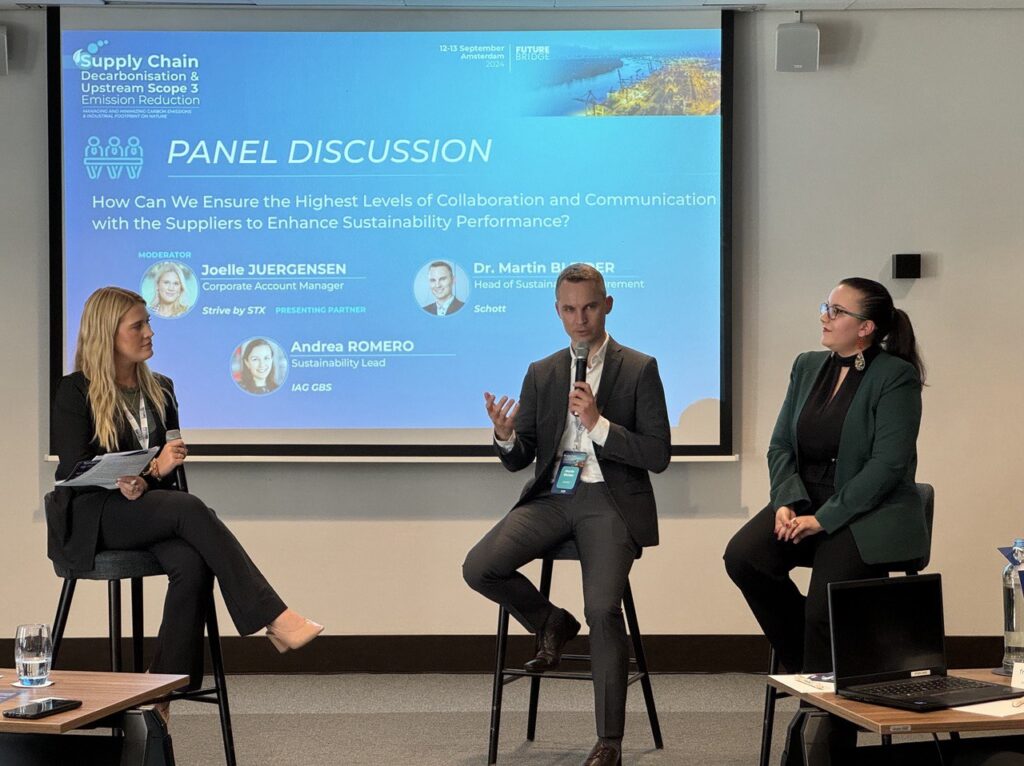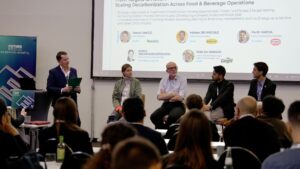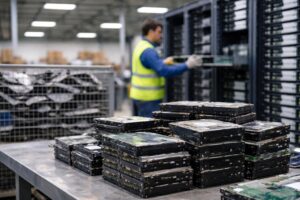A significant turning point in sustainable supply chain management occurred during the Net-Zero Supply Chain Summit. It took place in Amsterdam on September 12–13, 2024. Furthermore, leaders in the industry, authorities on sustainability, and creative thinkers convened for a two-day conference to talk about the difficulties in decarbonizing supply chains and reducing upstream Scope 3 emissions. It offered a platform for exchanging tactics and optimal methodologies amidst the Paris Agreement and increasing corporate dedication to science-based aims.

So, attendees explored everything from AI and big data for carbon footprint control, to new ideas for green logistics. The Net-Zero Supply Chain Summit underscored the need for immediate action and brought to light the need for partnership and cooperation to construct those strong, low-carbon supply chains in this age of geopolitical conflict and disturbance. Let us know more about the summit ahead in the article.
Sessions At The Net-Zero Supply Chain Summit
A wide range of sessions covering important facets of supply chain sustainability were offered during the Net-Zero Supply Chain Summit. Moreover, these sessions equipped participants with valuable knowledge and practical skills relevant to furthering their decarbonization activities. So, let’s take a look at them ahead:
How to Successfully Get Started on Your Supply Chain Decarbonization Journey?
Jenny Kwan, Director of Climate Action & Accountability at WBCSD, spoke on how to start the process of decarbonization in the supply chain. The session focused on goal setting and practical ways to decarbonize supply chains. Moreover, it was able to gain great interest by offering companies taking their first steps toward sustainability a strategic overview.
Managing Scope 3 Emissions
The IAG GBS Sustainability Lead, Andrea Romero, gave a presentation on controlling Scope 3 emissions. Furthermore, identifying emission sources, prioritizing actions to reduce emissions, defining objectives, and utilizing verification systems to ensure transparency were all discussed in the session. The speaker also spoke about supply chains’ use of innovation to reach net-zero targets and Scope 3 emission reporting for emission reduction.
DEMO: ClimEase All-in-one CBAM Software
Nicolas Endress, CEO & Founder of ClimEase, showcased their all-in-one CBAM software. With the help of this platform, EU importers and their supply chains can quickly report emissions. They can also access a marketplace for green suppliers and get carbon tax KPIs. Moreover, the session at the Net-Zero Supply Chain Summit discussed how technology can make compliance easier and further continue efforts to decarbonize the supply chain.
Leveraging Innovation and Technology for a Sustainable Supply Chain
Senior Manager of Supplier Sustainability at TE Connectivity, Arda Işıldar, directed this fireside conversation. Furthermore, the speaker discussed the ways through which technology and innovation can ignite sustainability in supply chains. It was also seen how modern approaches can transform the whole procedure.
Accelerate the Progress of our Suppliers on our Journey to Net Zero
The director of global operations sustainability at Philip Morris International, Charlotta Kuratli, gave direction on how to hasten suppliers’ transition to net-zero status. The primary subjects of conversation were supplier involvement, the need to enhance supplier competencies, and the requirement for inter-supplier cooperation to accomplish demanding environmental objectives.
Bridging the Carbon Gap: Strategic Procurement in Removals for a Sustainable Future
The topic of strategic procurement in carbon removals was covered by Joelle Juergensen, Corporate Account Manager at Strive by STX. Furthermore, the talk addressed the current status of the carbon removal market and worldwide net-zero pledges. It also went deep into creative ways to include supply chain sustainability in procurement procedures. This includes the use of cutting-edge carbon removal technology.
Supplier Engagement as Core Tool to Decarbonize the Supply Chain
The Head of Sustainable Procurement at SCHOTT, Dr. Martin Bleider, provided tactics for supplier participation in decarbonization initiatives. Furthermore, it covered using Scope 3 data to develop supplier programs, classify supplier maturity, and communicate expectations. It also covered working together to decrease emissions, recognize progress, and include internal organizations in these efforts.
Beyond Compliance: Decoding Scope 3 Data for Real Decarbonization
The director of WBCSD’s Partnership for Carbon Transparency (PACT), Naama Avni-Kadosh, discussed the differences between promoting true decarbonization and obtaining Scope 3 data for compliance. Furthermore, the session covered:
- Common myths of Scope 3,
- Data-driven decision-making tactics,
- The significance of utilizing a single, cohesive Scope 3 approach to promote supplier involvement
Case Study of Heidelberg Materials on Carbon-Captured Materials
A case study on carbon capture in cement manufacturing was given by Sergio Tortelli, Product Director of Heidelberg Materials for Net Zero Carbon Captured Solutions. Furthermore, the session began with an introduction to Heidelberg Materials, covered cement decarbonization levers, and included a demonstration of evoZero. It is the first net-zero carbon cement made using CCS technology. Additionally, it ended with industry outlooks.
Panel Discussion: Ensuring Collaboration and Communication with Suppliers
Joelle Juergensen from Strive by STX, Dr. Martin Bleider from SCHOTT, and Andrea Romero from IAG GBS participated in this panel. Using their varied experiences in supplier engagement, sustainability, and procurement, they talked about how to strengthen cooperation and communication with suppliers to improve sustainable performance.

Sustainable Business Development
Sustainable company development in supply networks was discussed by Jason Williams, vice president of supply chain at McDermott International Inc. Furthermore, the main topics of his session at the Net-Zero Supply Chain Summit were:
- Identifying future material demands,
- Minimizing environmental footprints in supply chain processes,
- And responsible sourcing techniques
Integrating Sustainability and Intelligence from Raw Materials to Packaging
Evonik’s Julia Elbert and Kirsten Karalis gave a session on incorporating sustainability across the supply chain. During their session, they discussed tactics for engaging suppliers and gathering data and baseline emission measurements for raw materials, logistics, and packaging. They also went deep into how to handle problems with reporting and precise sustainability monitoring when it comes to sustainability statistics.
Decarbonizing IKEA Supply Chain
Peter Moller, IKEA’s Sustainability Leader for Energy Purchasing Development, outlined the initiatives aimed at tackling the supply chain’s carbon emissions. During the presentation, the speaker highlighted IKEA’s objective of achieving net zero emissions by 2050. It focused on energy efficiency measures, the ban on fossil fuel use, electrification, and the transition to renewable and circular materials.
Credible Climate Action Plan in the Short, Medium, and Long Term
In a fireside chat, Ahold Delhaize’s Vice President of Climate & Environment Grant Sprick discussed creating realistic climate action plans. The topics of discussion included:
- How to translate 2050 objectives into concrete actions,
- How to monitor development and keep long-term climate goals in line,
- And how to close gaps in decarbonization initiatives.
How and Why FrieslandCampina Boosts Ocean Freight Sustainability
Walter Vermeer, Director of Logistics Excellence at FrieslandCampina, presented on enhancing sustainability in ocean freight. In this session, the speaker showcased its interventions to minimize emissions in maritime logistics. This includes demand management and other strategies.
Panel Discussion: Maximizing the Use of Data to Boost Sustainability
Walter Vermeer from FrieslandCampina, Jason Williams from McDermott International Inc., and Grant Sprick from Ahold Delhaize comprised the panel for this discussion. Drawing on their varied backgrounds in supply chain management, logistics, and climate action, they talked about methods for using data to improve sustainability initiatives throughout supply chains.
Also read: Post Event Highlights: 2nd Net Zero Energy Sourcing & Power Purchase Agreements Summit
Net-Zero Supply Chain Summit: Who Were The Event Partners?
The knowledge and assistance of the Net-Zero Supply Chain Summit’s main partners were vital to its success. These groups were crucial in determining the agenda and giving attendees insightful information on eco-friendly supply chains.
ClimEase – PRESENTING PARTNER
ClimEase is a firm specializing in CBAM (Carbon Border Adjustment Mechanism) compliance and supply chain decarbonization. They have a full software tool that does the surveying of suppliers’ emissions and also invites overseas manufacturers to become a part of their Green Supplier Database. Furthermore, the purpose of this project is to make the green producer more visible and to allow importers of manufacturing to more readily locate the greener substitutes. ClimEase’s approach also features a financial layer. It converts carbon footprints into future carbon tax liabilities. As a result, it provides financial visibility into long-term supplier agreements and ultimately facilitates the decarbonization of carbon-intensive industries.
Strive by STX – PRESENTING PARTNER
The STX group is an international trader of environmental commodities and climate solutions with a legacy of over 25 years. They’re all about putting a price on pollution and emissions, and about building confidence in market mechanisms for the decarbonized economy. Furthermore, STX Group allows the flow of capital to thousands of green projects around the world through their trading and corporate climate solutions. The company also gives corporations a certified receipt of their environmental contributions. Additionally, headquartered in Amsterdam, STX Group has a global presence. They have offices in thirteen countries and a team of over five hundred employees. This represents more than 60 nationalities.
To Sum Up
The Net-Zero Supply Chain Summit in Amsterdam provided a crucial platform for addressing urgent supply chain decarbonization challenges. Some of the top executives gave in-depth advice on Scope 3 emissions, how to get suppliers involved, how to use new technologies, and much more. Moreover, the participants attained complete approaches for driving sustainability programs in the face of aggressive net-zero goals and growing regulatory scrutiny along with insane networking opportunities.
Sustainable business practices are constantly changing and it is important to work together and share knowledge. To continue your sustainability journey and gain more insights, consider attending future events organized by Future Bridge. Taking part in these conferences will keep you abreast of the latest innovations within the industry and help you keep an edge over competitors. So, do not lose the opportunity and register right away!




